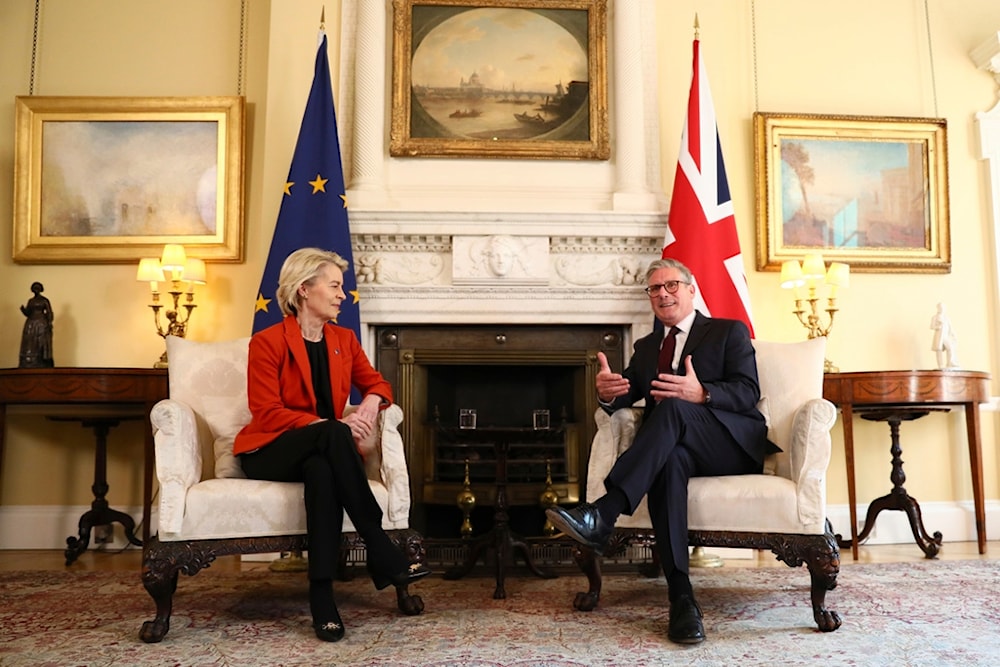UK, EU edge toward defense pact ahead of May summit
Participation in the SAFE fund would unlock significant opportunities for British defense firms such as BAE Systems and Rolls Royce, allowing them to compete for EU-backed projects.
-

Britain's Prime Minister Keir Starmer, right, and European Commission President Ursula von der Leyen, left, talk during a meeting at 10 Downing Street in London, England, Thursday, April 24, 2025. (Alishia Abodunde/Pool Photo via AP)
UK Prime Minister Keir Starmer hosted European Commission President Ursula von der Leyen in London on Thursday, as both sides intensify efforts to establish a robust security alliance ahead of a pivotal summit in May. The meeting signaled a breakthrough in UK-EU cooperation, with both leaders expressing optimism about the potential for a formal defense and security pact that could reshape post-Brexit relations.
Von der Leyen said the discussions may pave the way for the UK to join the EU's €150 billion SAFE program, a strategic initiative aimed at joint procurement of military equipment, including drones, missiles, and ammunition.
"We will discuss work on a strategic security and defense partnership agreement, which might pave the way then to a joint procurement and UK participation in our SAFE programme," she stated.
Participation in the SAFE fund would unlock significant opportunities for British defense firms such as BAE Systems and Rolls-Royce, allowing them to compete for EU-backed projects. However, access depends on the UK's willingness to sign a binding defense agreement with Brussels.
The May 19 summit is shaping up to be a milestone event, with officials hoping to finalize the pact amid growing anxiety in Europe over the United States' strategic reliability under President Donald Trump. Trump's administration has raised questions about NATO's future, prompting European governments to look inward for security cooperation. In response, the EU is increasingly focused on building autonomous defense capacity, and London's involvement in SAFE could signal renewed trust and practical alignment.
While the defense agreement is expected to headline the summit, other elements such as energy collaboration, youth mobility schemes, and streamlined food trade rules are also on the agenda. Still, long-standing disputes persist. France and other EU coastal states are reportedly conditioning progress on defense on concessions in fishing rights, advocating for a two-year extension of current access to UK waters.
Starmer, for his part, has been working to re-engage with Brussels while also seeking to secure favorable trade terms with Washington. UK Finance Minister Rachel Reeves is currently in talks with US officials to ease tariffs on key British exports, especially in agriculture and the automotive sector.
Read more: The growing rift: Why US is recalibrating its ties with Europe
Welcoming von der Leyen to Downing Street after their joint participation in a global energy security forum, Starmer underlined the urgency of closer cooperation.
"In a world which seems increasingly unstable with an uncertain future, it is so good that we are working so closely together on so many issues," he said. "I'm really pleased that we've committed to a reset of our relationship, a really important relationship, which I think will be of huge benefit to both of us."
While Starmer's government remains committed to forging closer ties with the EU, it has drawn clear red lines, ruling out any return to the single market, the customs union, or the resumption of free movement.
Meanwhile, Brussels continues to approach negotiations with its own priorities, complicating the path to a comprehensive agreement.

 3 Min Read
3 Min Read










